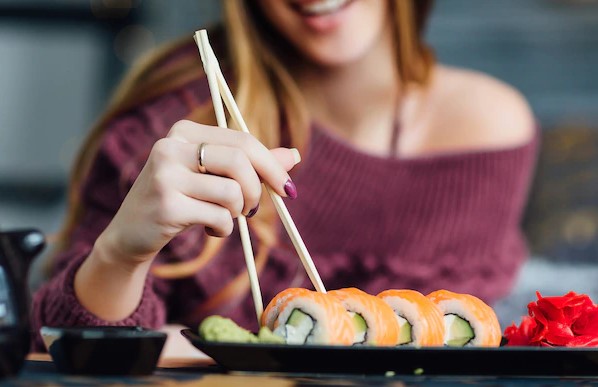Most sushi is safe for pregnant women, especially those with low mercury levels. Raw and undercooked sushi, however, can be risky for a pregnant woman, as they contain parasitic worms, dangerous bacteria, and significant mercury. To prevent these risks, sushi for pregnant women should be cooked properly. Read on to learn more about sushi safety for pregnant women. You’ll also find out why cooked salmon is better than raw.
As a pregnant woman, sushi was one of my favorite things. I would order it regularly and really loved it. But, after reading the research and my doctor telling me that sushi can be bad for you, I stopped eating sushi for a few months. After reading about sushi, I’ve decided to never eat sushi again. If you are pregnant and have been craving sushi, read this article to learn about the research on sushi being safe to eat for pregnant women — and you’ll also find out which types of sushi are not safe for you and your baby.

Cooked salmon is a good source of protein and minerals for pregnant women
Smoked or cooked salmon is a great choice for pregnant women due to its high protein content and healthy omega-3 fatty acids. However, it is important to consider its risk factors, including its mercury content, before eating it. As a result, pregnant women should stick to two servings of fish per week. Pregnant women should also avoid eating salmon if they have high levels of cholesterol, as it can cause serious health problems.
Besides being high in protein, salmon is also rich in other nutrients, such as minerals and vitamins. A 3-ounce serving of raw salmon contains only 5.4 grams of fat, of which 1.5 grams are omega-3 fatty acids and less than a gram is saturated. It also has an impressive 17 grams of protein, making it a fantastic choice for pregnant women. However, the smaller portion size is important, as portions in restaurants tend to be larger than recommended.
Raw fish is a source of parasitic worms
The FDA has recently issued a public warning regarding the consumption of raw fish, especially by pregnant women and young children. This warning reflects the fact that their immune systems are vulnerable to many types of food-borne illnesses, including parasitic infections. Even though sushi and sashimi are not considered unsafe for pregnant women, they should be avoided. They contain beneficial fatty acids that contribute to the healthy growth of a baby and lower the risk of obesity and heart disease.
While it may be difficult to notice a tapeworm in a sushi roll, sushi chefs are highly skilled at identifying them. They may be only a few millimeters long or smaller – about the size of a five-cent nickel. Sometimes, a small worm may manage to get past the screening steps, and a pregnant woman could have a fetus infected with this parasite.
Listeria is a threat to the fetus
It’s no secret that listeria can be a danger to the fetus when eating raw fish or uncooked sushi. While sushi has been re-refrigerated for several days, listeria can still grow and pose a threat to the fetus. While most cases of listeria are not severe, they can be fatal for the infant.
While Listeria is highly contagious, most people do not contract the infection. However, pregnant women and people with impaired immune systems are at greater risk. A mother infected with listeria during pregnancy may experience mild flu-like symptoms. The infection may also lead to miscarriage, stillbirth, and early labor. In rare cases, listeria can be transferred to the fetus before it is born, resulting in serious illness for the baby.

Avoiding raw fish during pregnancy
If you are pregnant, avoiding raw or undercooked fish is highly recommended. Though there are plenty of varieties of fish that are perfectly safe to eat when fully cooked, raw or undercooked fish contains potentially dangerous parasites and bacteria. Here are some guidelines to help you choose the best option:
The first 12 weeks of pregnancy are particularly sensitive for the baby, as the body begins to develop its organs. Raw fish is particularly hazardous during this period as your immune system is already weakened and can easily be compromised by bacteria and parasites. During this period, you should limit yourself to eating fish, shellfish and sushi to two or three times a week. If you are unsure whether you should eat sushi during pregnancy, consult your doctor first.
When it comes to sushi safety for pregnant women, there are several ingredients to be on the lookout for when making your selection. It’s best to choose items that include cooked or uncooked seafood. And although it might be hard to do, you should probably avoid smoked items like salmon and tuna as well. On the bright side, pickled ginger is safe to eat throughout your entire pregnancy.








